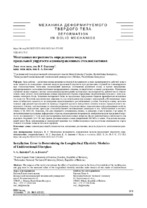Монтажная погрешность определения модуля продольной упругости однонаправленных стеклопластиков

Date
2025Publisher
Another Title
Installation Error in Determining the Longitudinal Elasticity Modulus of Unidirectional Fiberglass
Bibliographic entry
Барсуков, В. Г. Монтажная погрешность определения модуля продольной упругости однонаправленных стеклопластиков = Installation Error in Determining the Longitudinal Elasticity Modulus of Unidirectional Fiberglass / В. Г. Барсуков, Е. А. Евсеева // Наука и техника. – 2025. – № 5. – С. 373-382.
Abstract
Цель работы – расчетная оценка влияния монтажной погрешности в виде эксцентриситета рабочей зоны и зоны захватов на измеряемое значение модуля продольной упругости при растяжении стержней из однонаправленных стеклопластиков. Методика исследований включала составление расчетной схемы и анализ напряженно- деформированного состояния статически неопределенного стержня, подвергнутого осевому растяжению. Радиальное смещение конца стержня с жестко защемленными краями равно монтажному эксцентриситету рабочей части относительно зоны захвата. Дополнительные осевые деформации стержня определены энергетическим методом с использованием интеграла Мора. Влиянием поперечной силы на продольные деформации стержня пренебрегали вследствие его малости. Получена аналитическая зависимость для определения продольных деформаций, обусловленных влиянием изгибающего момента от эксцентрично прикладываемого растягивающего усилия. Расчетную оценку дополнительных деформаций производили на примере стержней круглого поперечного сечения и полос прямоугольного поперечного сечения, изготовленных из однонаправленных стеклопластиков с показателями деформационных свойств, идентичными показателям арматуры стеклопластиковой номинальным диаметром 6 мм, изготовленной в соответствии с СТБ 1103–98. Показано, что для стержней с отношением длины l к диаметру d или толщине h не менее 30 дополнительные продольные деформации стержня, определяющие погрешность измерения модуля продольной упругости, не превышают 1 % во всем рассмотренном диапазоне осевых нагрузок. Более заметный вклад наблюдается для коротких стержней (l/d = 20) при уровне растягивающих осевых напряжений 200 МПа и менее. Результаты исследований могут быть использованы в инженерной практике и в учебном процессе при подготовке специалистов строительного и химико-технологического профиля.
Abstract in another language
The purpose of the work is to estimate the effect of installation error in the form of eccentricity of the working area and grip zone on the measured value of the longitudinal elasticity modulus under tension of rods made of unidirectional fiberglass. The research methodology included the development of a calculation scheme and analysis of the stress-strain state of a statically indeterminate rod subjected to axial tension. The radial displacement of the end of the rod with rigidly clamped edges is equal to the installation eccentricity of the working part relative to the grip zone. Additional axial deformations of the rod are determined by the energy method using the Mohr integral. The effect of the transverse force on the longitudinal deformations of the rod was neglected due to its smallness. An analytical dependence was obtained for determining longitudinal deformations caused by the influence of the bending moment from an eccentrically applied tensile force. The calculation assessment of additional deformations was carried out using the example of rods with a circular cross-section and strips of rectangular cross-section, made of unidirectional fiberglass with deformation properties identical to those of fiberglass reinforcement with a nominal diameter of 6 mm, manufactured in accordance with СТБ [STB – Standards of the Republic of Belarus] 1103–98. It is shown that for rods with a ratio of length l to diameter d or thickness h of at least 30, additional longitudinal deformations of the rod, determining the error in measuring the modulus of longitudinal elasticity, do not exceed 1 % in the entire considered range of axial loads. A more noticeable contribution is observed for short rods (l/d = 20) at a level of tensile axial stresses of 200 MPa and less. The research results can be used in engineering practice and in the educational process in the training of specialists in the construction and chemical engineering profile.
View/
Collections
- № 5[8]
